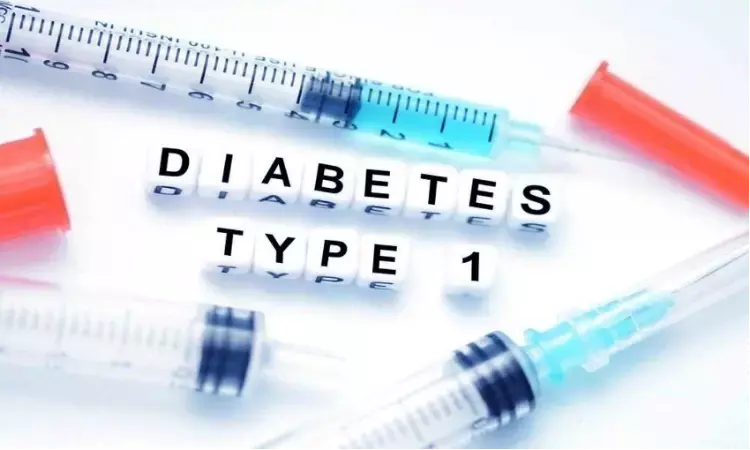- Home
- Medical news & Guidelines
- Anesthesiology
- Cardiology and CTVS
- Critical Care
- Dentistry
- Dermatology
- Diabetes and Endocrinology
- ENT
- Gastroenterology
- Medicine
- Nephrology
- Neurology
- Obstretics-Gynaecology
- Oncology
- Ophthalmology
- Orthopaedics
- Pediatrics-Neonatology
- Psychiatry
- Pulmonology
- Radiology
- Surgery
- Urology
- Laboratory Medicine
- Diet
- Nursing
- Paramedical
- Physiotherapy
- Health news
- Fact Check
- Bone Health Fact Check
- Brain Health Fact Check
- Cancer Related Fact Check
- Child Care Fact Check
- Dental and oral health fact check
- Diabetes and metabolic health fact check
- Diet and Nutrition Fact Check
- Eye and ENT Care Fact Check
- Fitness fact check
- Gut health fact check
- Heart health fact check
- Kidney health fact check
- Medical education fact check
- Men's health fact check
- Respiratory fact check
- Skin and hair care fact check
- Vaccine and Immunization fact check
- Women's health fact check
- AYUSH
- State News
- Andaman and Nicobar Islands
- Andhra Pradesh
- Arunachal Pradesh
- Assam
- Bihar
- Chandigarh
- Chattisgarh
- Dadra and Nagar Haveli
- Daman and Diu
- Delhi
- Goa
- Gujarat
- Haryana
- Himachal Pradesh
- Jammu & Kashmir
- Jharkhand
- Karnataka
- Kerala
- Ladakh
- Lakshadweep
- Madhya Pradesh
- Maharashtra
- Manipur
- Meghalaya
- Mizoram
- Nagaland
- Odisha
- Puducherry
- Punjab
- Rajasthan
- Sikkim
- Tamil Nadu
- Telangana
- Tripura
- Uttar Pradesh
- Uttrakhand
- West Bengal
- Medical Education
- Industry
Type 1 diabetes can present in infants as young as 6 months: Study

UK: Type 1 diabetes (T1D) can present before the age of 6 months, finds a recent study in the journal Diabetologia. The findings highlight the need for comprehensive genetic testing for neonatal diabetes genes for all patients diagnosed at less than 6 months of age.
"We provide strong evidence that type 1 diabetes can present before the age of 6 months based on individuals with this extremely early-onset diabetes subtype having the classic features of childhood T1D: high genetic risk, autoimmunity and rapid beta cell loss.
Diabetes diagnosed at <6 months of age is usually monogenic. However, 10–15% of affected infants do not have a pathogenic variant in one of the 26 known neonatal diabetes genes. Richard A. Oram, University of Exeter Medical School, Exeter, UK, and colleagues characterized infants diagnosed at <6 months of age without a pathogenic variant to assess whether polygenic type 1 diabetes could arise at early ages.
The researchers studied 166 infants diagnosed with type 1 diabetes at <6 months of age in whom pathnts pathogenic variants in all 26 known genes had been excluded. They were compared with infants with monogenic neonatal diabetes (n = 164) or children with type 1 diabetes diagnosed at 6–24 months of age (n = 152). Type 1 diabetes genetic risk score (T1D-GRS), islet autoantibodies, C-peptide and clinical features were then assessed.
Key findings of the study include:
- The researchers found an excess of infants with high T1D-GRS: 38% (63/166) had a T1D-GRS >95th centile of healthy individuals, whereas 5% (8/166) would be expected if all were monogenic.
- Individuals with a high T1D-GRS had a similar rate of autoantibody positivity to that seen in individuals with type 1 diabetes diagnosed at 6–24 months of age (41% vs 58%, and had markedly reduced C-peptide levels (median <3 pmol/l within 1 year of diagnosis), reflecting rapid loss of insulin secretion.
- These individuals also had reduced birthweights (median z score −0.89), which were lowest in those diagnosed with type 1 diabetes at <3 months of age (median z score −1.98).
"The early-onset association with reduced birth weight raises the possibility that for some individuals there was reduced insulin secretion in utero. Comprehensive genetic testing for all neonatal diabetes genes remains essential for all individuals diagnosed with diabetes at <6 months of age," concluded the authors.
The study, "Type 1 diabetes can present before the age of 6 months and is characterised by autoimmunity and rapid loss of beta cells," is published in the journal Diabetologia.
DOI: https://link.springer.com/article/10.1007/s00125-020-05276-4
Dr Kamal Kant Kohli-MBBS, DTCD- a chest specialist with more than 30 years of practice and a flair for writing clinical articles, Dr Kamal Kant Kohli joined Medical Dialogues as a Chief Editor of Medical News. Besides writing articles, as an editor, he proofreads and verifies all the medical content published on Medical Dialogues including those coming from journals, studies,medical conferences,guidelines etc. Email: drkohli@medicaldialogues.in. Contact no. 011-43720751


